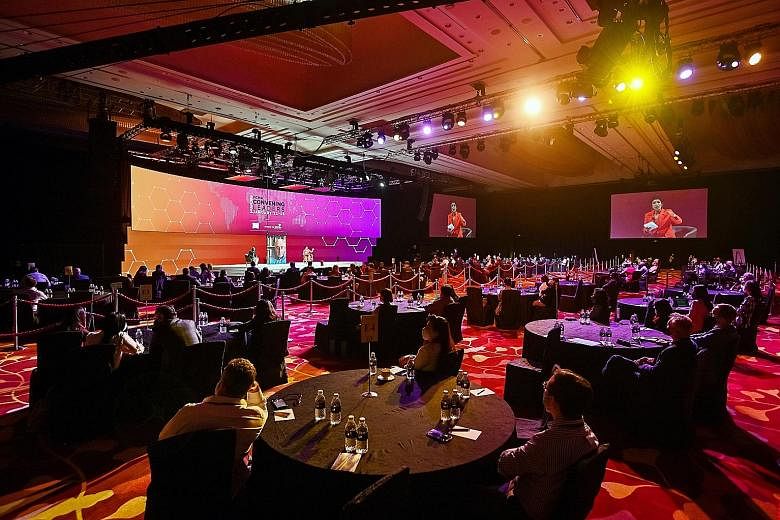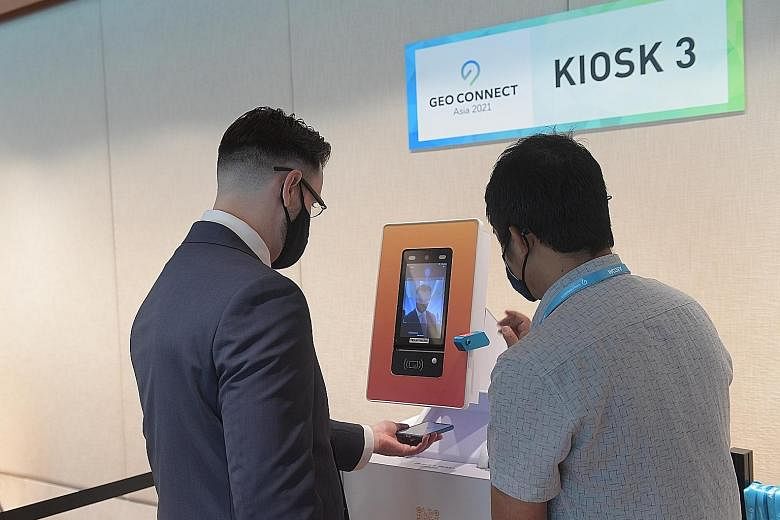While industry players in the meetings, incentives, conventions and exhibitions (Mice) sector welcome the move to increase capacity limits at these events, some are also concerned about the additional costs that come with managing more people.
On March 24, the Health Ministry announced that from April 24, capacity limits for Mice events will be increased to 750 people, up from 250. Attendees will have to be split into zones of up to 50 people each and safe distancing has to be observed.
Mr Aloysius Arlando, president of the Singapore Association of Convention and Exhibition Organisers and Suppliers (Saceos), said: "It is actually a much-needed boost for our industry. This is a step forward, given our very safe and calibrated approach towards restarting and reopening our economy, particularly to travel and international visitors."
Mr Arlando, who is also chief executive for venues at venue management and events development company SingEx-Sphere Holdings, said that since the news broke, the company has been receiving a "steady stream" of inquiries for events of more than 250 people.
He added: "While the increase in capacity opens up more oppor-tunities, it is also a different operating environment now. Considerations such as consumer behaviour and increase in operational costs have an impact on commercial viability, which is equally, if not more, important."
Some are concerned about the overheads that will rise with ca-pacity, as more resources will be needed for crowd control measures.
The additional cost will be substantially higher, said Mr Kamen Lim, founder and director of events management firm 1 M.I.C.E.
He added: "There has to be more signage put up, more people to manage safe management measures. The venues also have to be bigger to be able to accommodate more people. In the Covid-19 age, one person's space is the equivalent of three people's. Staff are also commanding a higher pay because the nature of the job is high-risk."
Aspen Event Planners director Leslie Windrath said he projects that total costs will increase by 20 per cent to 30 per cent. "I think this is a new challenge that event planners and organisers have to face in organising Mice events in the Covid-19 era, on how to manage costs and adhere to safe management measures," he added.
Another factor that adds to costs is pre-event testing, which will be required at Mice events of more than 250 people.
Mr Arlando said pre-event testing costs have been borne by event organisers and their partners as part of operating costs. It is believed the testing costs are not passed on to attendees.
He added that Saceos is looking at working with other industry stakeholders to develop partnerships with testing vendors to be deployed at different events, to leverage economies of scale which may lower the cost of the tests.
Event planners and organisers also believe that Mice attendees would be willing to foot the bill if needed.
TLC Events CEO Thomas Lim said: "To businessmen, these are nominal costs which will most likely be treated as business expenses. People will still choose to pay a small fee to attend events because these are business opportunities, which may be hard to come by now."
It has been reported that the cost of an antigen rapid test is under $50, and is likely to drop further.
Ms Karen Bolinger, managing director for Asia-Pacific at PCMA, an association for business event strategists, said: "I think people are just ready to meet, there is an anticipation out there, so I don't think the cost of a test, or even the idea of a test, will be a deterrent."
The Singapore Tourism Board said some events are keen on scaling up the number of attendees.
These include the Hotel Investment Conference Asia-Pacific in October, as well as Insuretech Connect Asia in June.



